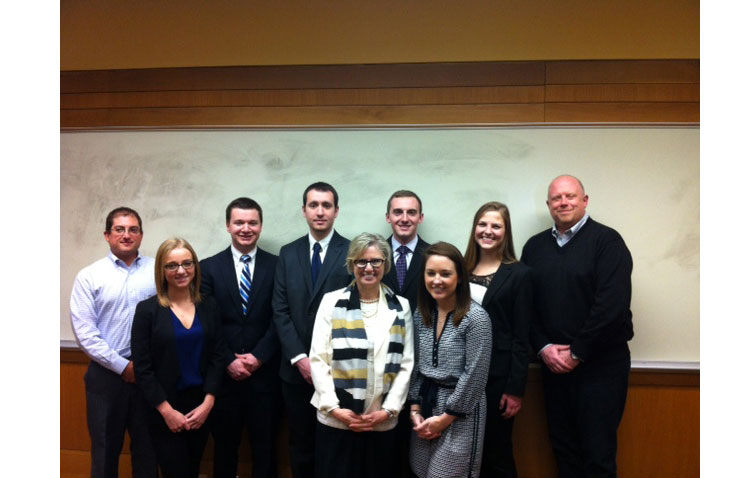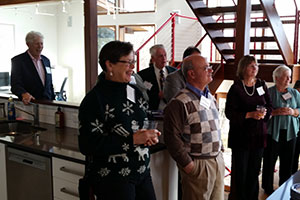Hartford Courant– Where is the Stanley Black & Decker share price heading? On Thursday night at UConn’s Graduate Business Learning Center in downtown Hartford, the answer depended on which team of financial analysts was talking.
Hartford Financial Services Hosts the 5th Annual HFS Case Competition at UConn

On Friday, March 6th, eighteen UConn School of Business students competed in the Hartford Financial Services Case Competition. This is the 5th year in a row that The Hartford has invited UConn students to participate in a case competition here at UConn for a $1,000 cash prize.Continue Reading
U.S. News Names UConn’s MBA Program Among Top 50 in Nation, Top 25 Among Public Universities
The University of Connecticut School of Business has been ranked among the Top 50 “Best Graduate Business Schools” for 2016 by U.S. News and World Report.
The Full-time MBA Program is ranked No. 48 nationally. Among public colleges and universities, UConn ranks No. 23, up from No. 28 last year, and was the top program in that category in New England, according to the same report.
This is the fifth consecutive year that UConn has improved its standing, and the first time it has been in the Top 50.
“The annual improvement in our rankings, for the last five years, reflects our persistent efforts at continuous improvement,” said School of Business Dean John A. Elliott. “I appreciate the investment by faculty, staff, students and employers that have produced these improvements.”
Meg Warren, interim director of the Full-time MBA Program, said the Top 50 ranking is a tribute to the entire School of Business.
UConn School of Business Among Military Times’ Best for Veterans
 The UConn School of Business is among the “Best for Veterans—Business Schools 2015” according to a report released Monday by Military Times.
The UConn School of Business is among the “Best for Veterans—Business Schools 2015” according to a report released Monday by Military Times.
UConn ranked No. 54 nationally, in a year that saw record applications and a process that was highly competitive. It is one of many recognitions that the University has received for its veteran programs, which include an Entrepreneurship Bootcamp for Veterans with Disabilities (EBV). Last year, the UConn EBV and School of Business were recognized by Newman’s Own Foundation as one of the five best veteran non-profit organizations in the country.
My Top 10 Favorite Things About Being a UConn Business Student
As my college career is quickly coming to an end, with graduation in just two months, I am growing increasingly nostalgic for the days when I was just beginning my classes, and just beginning to learn what the business world is really about. Being a part of the UConn School of Business has been very important to my success in college. It has taught me so much, and provided me with so many opportunities and advantages that I am so happy I utilized. Of all of the things that have made being a business student so great, here are my top 10:Continue Reading
The Cornell HR Review Invites Essays from Undergraduate and Graduate Students
The Cornell HR Review is proud to announce its 6th Annual Student Essay Competition, sponsored by Shell, Dell and GE! They encourage submissions from all students pursuing a graduate or undergraduate HR-related degree—including labor relations, industrial/organizational psychology, and business.
Prizes for the competition are: $1000 for first place, $500 for second, and $250 for third. Winning essays will be published in the HR Review. Additionally, winners will be invited to attend the Cornell Human Capital Symposium in Fall 2015—an excellent opportunity to interact with some of the world’s top HR executives.
Essays must address one of three prompts and be between 1,000-1,600 words. All submissions are due by April 14, 2015.
For complete information, visit 6th Annual Essay Competition (2015)
School of Business Retirees Gather for Business, Friendship
 Addressing a gathering of retired- and almost-retired UConn faculty, School of Business Dean John A. Elliott urged them to use their expertise to help mentor junior staff and graduate students.
Addressing a gathering of retired- and almost-retired UConn faculty, School of Business Dean John A. Elliott urged them to use their expertise to help mentor junior staff and graduate students.
Dean Elliott thanked those congregated for their years of service to the School of Business, their willingness to act in an advisory capacity to him and to newer faculty, and recognized them as a vital connection to some of the School’s most illustrious alumni.
Rob Hoskin, Harry Johnson, Keith Johnson, Lin Klein, Jeffrey Kramer, Richard Norgaard, David Palmer, Murphy Sewall, James Sfiridis, Susan Spiggle and Crayton Walker were among those assembled, with their significant others, at the beautiful Mansfield home of Richard Norgaard and Karen Zimmer. Dean Elliott’s charming wife, Laura Philips, also attended the first formal gathering of retired faculty on Dec. 7.
Other important purposes of the meeting were to reinforce contacts among lifelong colleagues, share memories and enjoy each other’s company. Attendees enjoyed a catered, champagne brunch, entered a drawing for door prizes and shared stories of those who could not be present that day but wished to be remembered to all, such as Karla Fox who was in New York at the birth of her fourth grandchild.
One interesting discovery is the creative outlets in which some retirees are engaged. Michael Lubatkin has just published a scholarly book, but focused more in the area of philosophy than in management. Dick Kochanek has been painting for a number of years and his artwork has evolved such that he is currently receiving accolades at juried shows. Rob Hoskin has honed his skills as a craftsman and produces beautiful objects in wood.
Among those who could not attend is Steve Messner. His daughter would love to deliver any notes and well wishes, so please write to Steve in care of: Stephanie Brown, 144 Woodleaf Drive, Winter Springs, FL 32708.
Planning is underway to host a Spring 2015 event on the Storrs campus. More information will be provided soon. Those wishing to remain in touch should contact Cynthia H. Adams, Professor Emerita from the former School of Allied Health, at cindyadams930@gmail.com or 860-230-8951.
Photos from the gathering can be viewed here.
Do Investors See Through Mistakes in Reported Earnings?
DSDA Helps Diverse Business Accelerate Growth with Travelers as Funding Sponsor
Digital Journal – The Diverse Supplier Development Academy (DSDA), a Connecticut non-profit organization that works to develop opportunities for diverse Connecticut-based suppliers, is honored to announce the addition of The Travelers Companies, Inc. as a funding sponsor.
The DSDA was launched in 2013 with the active participation of Northeast Utilities, the UConn School of Business Financial Accelerator and input from several diverse businesses during pilots in 2011.
UConn Receives $435,000 Grant to Create Particle Board with Recycled Carpeting; School of Business’ MBA Students Will Perform Marketing Viability Study
 The University of Connecticut’s School of Engineering and the Institute of Materials Science have received a $435,000 research grant to develop products made from particle board containing recycled carpeting. Approximately $100,000 will be apportioned to the UConn School of Business to perform an economic and market analysis for these new products, which are targeted to the construction industry.
The University of Connecticut’s School of Engineering and the Institute of Materials Science have received a $435,000 research grant to develop products made from particle board containing recycled carpeting. Approximately $100,000 will be apportioned to the UConn School of Business to perform an economic and market analysis for these new products, which are targeted to the construction industry.
Richard Parness, Ph.D., a UConn faculty member in the Polymer Program of Institute of Material Sciences will develop and test the products, in conjunction with colleagues Ioulia Valla and George Bollas. Parness has tremendous expertise in this field, having patented other particle board while at UConn.
The grant is sponsored by the Carpet America Recovery Effort (CARE), whose purpose is to develop market-based solutions for recycling and reusing post-consumer carpet. In 2013, some 3.7 billion pounds of carpeting was sent to landfills. Since then, CARE members have been successful in diverting more than 3.25 billion pounds of carpeting from landfills in the U.S., according to Robert Peoples, Ph.D., and CARE executive director. Because of its complex fabric and chemical makeup, recycling of carpet is particularly complex.
The UConn School of Business marketing analysis will be carried out by graduate students in the Stamford Learning Accelerator (SLA), said Brian Brady, SLA Director and co-investigator of the grant. “MBA students will be assessing the market opportunity for these new products, and will help identify optimal target customers and develop a pricing- and distribution- strategy. We are excited about the potential of patented particle board products incorporating post-consumer carpeting as one solution in aiding the sustainability efforts of CARE.”
The research will begin this summer and will take approximately a year.
“The fact that UConn was selected for this project is exciting,” Brady said. “This grant is substantial, and represents a cross-disciplinary effort between the School of Business and the School of Engineering and is a further example of the ongoing collaboration between both. We are excited to work with CARE, Dr. Parnas and his colleagues on this project in hopes that UConn’s efforts can help play a role in improving our environment and local communities.”